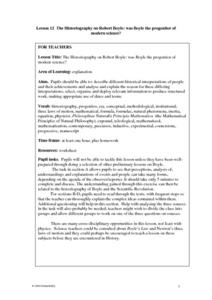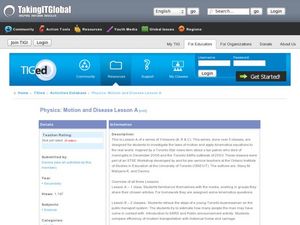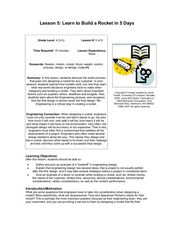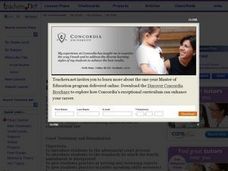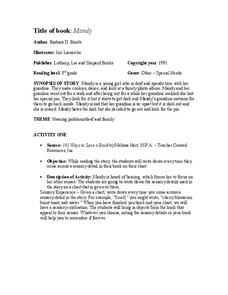Curated OER
Your Right to an Attorney
An outstanding lesson on a person's right to have attorney's representation in a court case is here for your young learners of the law. Pupils read a lengthy account that spells out the laws regarding legal representation, then answer...
Curated OER
Lesson 4 Activity 1: Mapping the Third Dimension
Students work in pairs to construct a simple stereoscope.
National Endowment for the Humanities
Lesson 4 James Madison: Internal Improvements Balancing Act—Federal/State and Executive/Legislative
Who has the power? The founding fathers asked the same question when the United States was formed. Learners explore issues that arose during Madison’s presidency that raised constitutional questions. Through discovery, discussion, and...
Curated OER
Leading Scientist of the Scientific Revolution
Quiz your class on how well they know the leading scientist of the scientific revolution. They answer seven multiple choice questions that require them to know each major contribution of each of the following scientists: Galileo, Newton,...
Curated OER
The Historiography on Robert Boyle: Was Boyle the Progenitor of Modern Science?
Students participate in a warm-up activity by attending a football match writing an account of who won the game. They discuss how their account could differ from someone else's account of the game. They discuss how different people's...
Curated OER
Physics: Motion and Disease
Learners read media and identify examples of science technology and society. In this physics activity, students learn about acceleration and velocity. Learners estimate how many people would have come in contact with a person who...
Curated OER
The 1970s in America
In this 1970s worksheet, 9th graders answer ten questions with a word or phrase, decide which event (in three different pairs) occurred first, then link two groups of words together by writing what they share in common.
Curated OER
Death penalty debate
Students debate the motion, "the USA is right to have capital punishment." Students begin by researching and writing their arguments to support or oppose the motion. After the debate, students vote according to their beliefs.
Curated OER
The First Ladies
Students compare two First Ladies. In this American history lesson, students read speeches given by Barbara Bush and Hillary Rodham Clinton. Students respond to questions about the speeches.
Curated OER
Using the Amnesty Interactive CD-ROM
Students view the Amnesty Interactive CD-ROM and investigate different aspects of human rights around the world. They identify people who have contributed to human rights, documents from ancient to modern times that have contributed to...
Curated OER
History of Supreme Court
Students study the role of the U.S. Supreme Court in U.S. history. They explore current events about the U.S. Constitution and discuss the Marbury v. Madison case from 1803. They identify the term "judicial review" and judicial...
Curated OER
Learn to Build a Rocket in 5 Days
Students explore physics by participating in an engineering activity. In this rocket instructional activity, students define a list of scientific vocabulary terms such as "re-engineering" and "trade-off." Students identify the rocket...
Curated OER
Courtroom Testimony and Presentation
Twelfth graders examine the court process and practice writing and reviewing reports. They practice their public speaking skills as they pretend to present information to a court.
Curated OER
Mandy
Third graders read Barbara D. Booth's, "Mandy" while noting each time they read a sensory detail. They read about the young girl in the story who is hard of hearing and determine how her other senses are heightened. Also, they determine...
Curated OER
U.S. Gay Marriage Victory
In this Gay Rights instructional activity, learners read an article about gay marriage rights and answer 9 true or false questions, 9 vocabulary matching questions, and a cloze activity based on the article.




